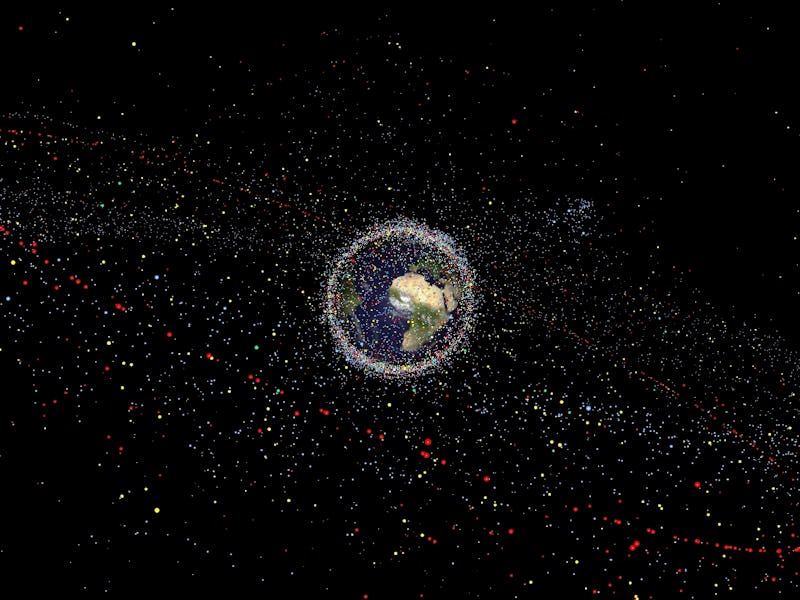Scientists Use Game Theory to Seek and Destroy Dangerous Space Debris
The commons don't have to be tragic when the commoners know math.

Space debris continues to pile up in Earth orbit. There are currently more than half a million pieces of junk larger than one centimeter speeding around the Earth at more than 22,000 miles per hour. Each one of those pieces has the potential to damage or even destroy satellites and the other equipment nations and companies use to provide science and services to people back on the ground. It’s a big problem and one that no government or company wishes to solve alone.
Creative problem solvers have pitched innumerable strategies, many ridiculous, for dealing with the space junk threatening our instruments and spacecraft: There is even a plan to create orbital harpoons and a lasers initiative. But researchers at the University of Liverpool have a slightly less trigger-happy approach. Their plan is to mitigate and remediate orbital debris using math, specifically game theory.
Game theory is the process of using mathematical modeling to solve a specific problem or set of problems. Much of this has to do with understanding how to assess probability and risk within the context of decisions. While game theory is predominantly used to explain economics and politics, it proves helpful whenever logic is driving towards resolution.
The relevant game theory idea in this particular case is “the tragedy of the commons,” a phrase you’ve likely heard in public policy discussion. The idea is that when disparate groups or individuals rely on the same resource, they often don’t manage it in concert and deterioration ensues.
That’s essentially the crux of the problem posed by orbital debris. Earth’s orbit is an essential area that industry and governments around the world use. But everyone would prefer that another organization takes action, so they don’t have to foot the bill. Of course, if everyone thinks like this and treats orbital debris like a game of chicken, no one will take action. As the problem worsens, the likelihood that those debris fragments will damage other objects rises — as does the likelihood that the ensuing destruction creates more debris. The overall costs rise for everyone.
Enter computer scientist Karl Tuyls and his team at the University of Liverpool. Supported by the European Space Agency, the group is looking at determining what the optimal types of removal efforts from agencies and governments around the world would be in dealing with space debris. Tuyls is hoping that complex mathematical modeling will help demonstrate how different entities can each play a proportional role in helping eliminate the production of new debris as well as investing in smart technology that can actually work towards reducing the quantity of that junk down. They want to organize the commoners in order to save the commons.
The Liverpool team is taking advantage of the fact that technology makes it much easier to apply game theory to a wide array of situations. The team is essentially building different automated computer programs to act as proxies for various governments and businesses that have a stake in seeing a safe Earth orbit. Those programs can be designed to take on traits that better mimic the more irrational aspects of human decision making.
“This will then enable us to better understand how different debris removal strategies might work and determine the best ones for different players to take,” Tuyls recently wrote in a piece for The Conversation. “For example, each player could commit to removing one piece of debris each year, or a number of pieces proportionate to the number of new satellites the player launches. Game theory can basically tell us whether we can expect such strategies to result from the self-interested interaction between the parties involved.”
Tuyls hopes the end result will give those ‘players’ the information they need to come together as a group and finally take action to sidestep tragedy. Whether this involves throwing a wide net that will simply capture all the debris, surrounding the planet in a current of electricity, or something a little more modest remains to be seen.